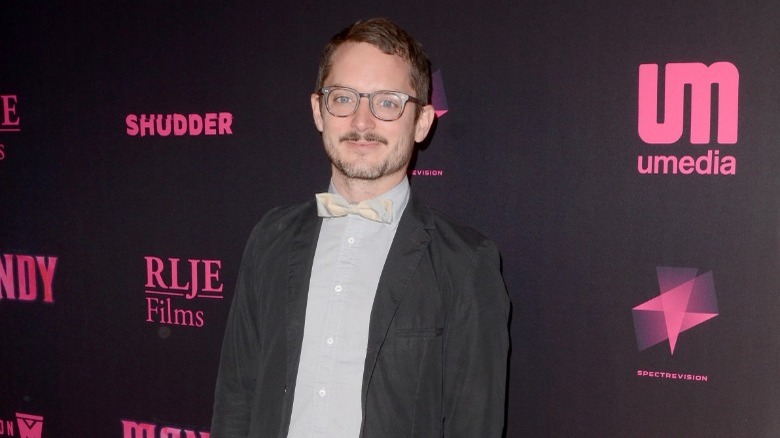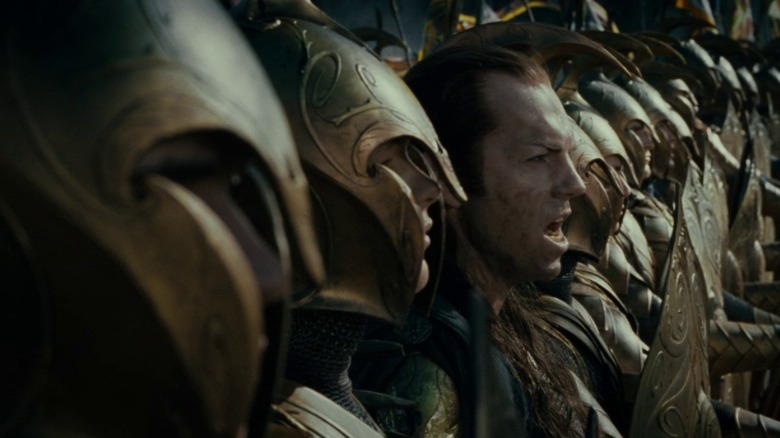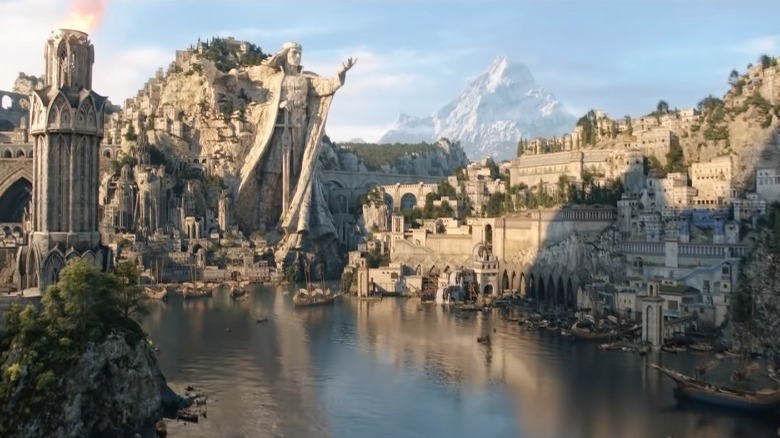How Elijah Wood Really Felt About The Rings Of Power Before It Had A Title
The upcoming Amazon Prime Video series "The Lord of the Rings: The Rings of Power" has all the makings of one of the defining television events of the year. And we're not just talking about its much-publicized standing as the record-breaking most expensive TV series of all time, enticing as that factor may be. What really makes "The Rings of Power" so momentous, simply put, is that it's a return to the verdant, expansive, overpowering landscape that is the imagination of J.R.R. Tolkien — and a section of it we have not yet seen visualized on screen, for that matter.
Developed by J. D. Payne and Patrick McKay, "The Rings of Power" will revisit a point in Tolkien's dense Middle-earth timeline thousands of years removed from the events famously depicted in Peter Jackson's beloved "The Lord of the Rings" trilogy (and Peter Jackson's less beloved "The Hobbit" trilogy). The historical episodes that set the stage for the adventures of Frodo, Gandalf, Aragorn, et al, and which 2001 film "The Lord of the Rings: The Fellowship of the Ring" handsomely summarized in one of the most famous prologues in movie history, will now be given full time and attention: The forging of the titular Rings, the rise of the dreadful Sauron, the last stand of Elves and Men against Sauron's dark forces.
Incidentally, this temporal distance informed a surprising opinion voiced by Elijah Wood, who played Frodo in the "Rings" films, back before the Prime Video series got an official title.
Elijah Wood once argued the series shouldn't be just called The Lord of the Rings
For months before the title of the uber-expensive Prime Video fantasy series was confirmed to be "The Lord of the Rings: The Rings of Power," it was generally referred to by its tentative working title of "The Lord of the Rings." In fact, back in February 2021, in an interview with Empire, Elijah Wood sounded off about the prospect of a show with that title covering different subject matter from Tolkien's proper "Lord of the Rings" novel and its corresponding film adaptations.
Like any Tolkien nerd worth their salt, Wood has his Middle-earth chronology straight; as such, it's no surprise that he at the time told Empire, "I find it very bizarre that they're calling it 'Lord of the Rings' as a shorthand, because it's not 'Lord of the Rings!' It takes place in the Second Age of Middle-earth."
Per NME, that was not the first time Wood had pointed out the "slightly misleading" nature of naming a Second Age-set tale "The Lord of the Rings." In 2020, the actor said, "From what I understand, the material they are working on exists chronologically further back in history in the lore of 'Lord of the Rings' or Middle-earth than any characters represented in 'Lord of the Rings' ... It sounds more Silmarillion era. Not to get nerdy, but it's the Second Age of Middle-earth."
The Second Age of Middle-earth is rife with potential for exploration
In Tolkien lingo, the Second Age is, of course, the period spanning the flourishing of the kingdom of Númenor and Sauron's first reign of terror. It ends with Sauron's initial defeat and retreat into the shadows at the hands of the last alliance between Elves and Men, and is followed by the Third Age, in which "The Lord of the Rings" (book and Peter Jackson trilogy) takes place.
The Second Age exists primarily as background context in the actual novels written and published by Tolkien in life — that is, "The Hobbit" and "The Lord of the Rings." As aptly noted by Elijah Wood, what we know about the period before those books stems mostly from appendices to "The Lord of the Rings," and from "The Silmarillion," a massive mythopoetic collection of descriptions, stories and chronicles Tolkien wrote about his fictional universe, culled together as a book and published posthumously by Tolkien's son Christopher Tolkien.
Being that there are no proper novels set in the Second Age, that period of Tolkienian history has never been brought to screen outside the prologue of "The Fellowship of the Ring," even though it's just as momentous in its own way as the One Ring saga. Therefore, "The Rings of Power" has the potential to break new ground as an adaptation.
Still, the question remains: If it's not a straight "Lord of the Rings" adaptation, what is "The Rings of Power" an adaptation of?
The Rings of Power is pulling diffusely from a variety of sources
"The Lord of the Rings: The Rings of Power" bills itself as being officially "based on the novel by" J.R.R. Tolkien (via IMDb) — which would seem to indicate that series masterminds J. D. Payne and Patrick McKay will be pulling from the appendices to "The Lord of the Rings," in which Tolkien gives readers a brief panorama of pre-Third Age Middle-earth history.
For a series based on information that once existed primarily in the function of context notes to Tolkien's proper novelistic work, the "Lord of the Rings" appendices seem like a fitting enough choice of source material. But that choice is at least partly informed by the fact that the showrunners didn't manage to secure the rights to "The Silmarillion." Legally, the Prime Video series can only cover characters and events depicted in "The Lord of the Rings," "The Hobbit," and corresponding appendices.
What that means is that technically, in a roundabout way, Elijah Wood never had any cause for concern. "The Lord of the Rings: The Rings of Power" actually is "Lord of the Rings," in the literal sense of being an adaptation of that specific book. It's just that it won't be an adaptation of the actual storytelling portions that most readers focus on. Even so, the potential is there; the appendices touch on plenty of enticing Middle-earth lore. Now let's hope the series fulfills it.



